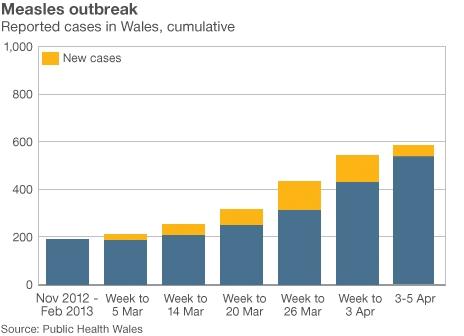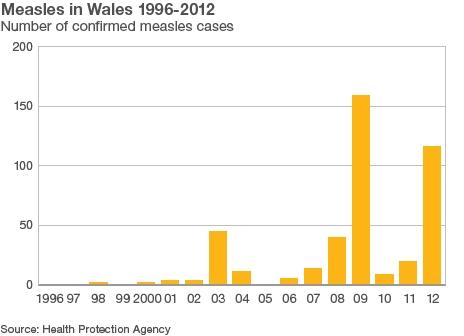Swansea measles epidemic: Parents urged to vaccinate children
- Published
Health officials have welcomed a rise in vaccinations but estimate 3,800 children have still not had MMR jabs
Parents in south Wales are being urged to get their children vaccinated as soon as possible, after the number of confirmed cases in a measles outbreak there reached 588.
Drop-in clinics will be open in hospitals across the region on Saturday, amid fears that thousands of children still need an MMR jab.
Vaccinations will also be given in schools following the Easter break.
Public Health Wales figures show 47 new cases of the disease since Wednesday.
About 60 people are in hospital in Swansea after contracting measles, some with symptoms of pneumonia and others with dehydration.
Health officials have welcomed a rise in vaccinations but estimate 3,800 children have still not had MMR jabs.
Numbers coming forward for jabs have increased, with just under 600 in the Abertawe Bro Morgannwg University Health Board(ABM UHB) area receiving the unscheduled MMR vaccine in the past week.
That figure does not include children who are vaccinated as normal at ages 13 months and three years four months.
Vaccination catch-up sessions are being held all day on Saturday in Swansea, Neath Port Talbot and Bridgend to encourage further uptake.
But Public Health Wales has warned that the likelihood that unvaccinated children across the country will come into contact with those already infected is still high.
Officials say those not vaccinated are highly likely to catch the disease and it is just a matter of time before a child is left with serious and permanent complications such as eye disorders, deafness or brain damage, or dies.
A spokeswoman for the ABM health board said a programme of vaccinating school children who are known to be unvaccinated in schools will begin after the Easter holidays.
She said some vaccinations took place before Easter in schools where there were cases of measles.
School vaccinations will initially concentrate on Swansea and will also target comprehensive schools where large numbers of pupils missed out on vaccinations as babies.
Schools in the city are due back on 15 April.
Although the epidemic is centred on Swansea cases continue to be reported across Wales.
The majority are in Abertawe Bro Morgannwg, which as well as Swansea also includes Neath, Port Talbot and Bridgend; there are also cases in Powys and the Hywel Dda Health Board area, which covers Carmarthenshire, Ceredigion and Pembrokeshire.
Dr Marion Lyons, director of health protection for Public Health Wales, said: "We are really pleased to see that 586 people have proactively got the MMR vaccine over the past week, on top of those already scheduled to have it.
"Though this is a good start, there are still thousands of children who have not had both doses of the MMR jab and so are still at risk from becoming infected with the potentially fatal measles virus.
"It's great to see that more parents are trusting the vaccine and I would encourage others to follow their lead.
"Measles cannot be taken lightly because you can never tell who will go on to develop the more serious complications of pneumonia or encephalitis (inflammation of the brain). MMR vaccination offers the only protection against these complications."

For pregnant women, there is also the risk of miscarriage.
Health officials estimate about 3,800 children in the Swansea area have still not had the MMR vaccine and parents are being asked to act.
'Spreading fast'
Public health officials said take-up for the MMR vaccine in south Wales dropped significantly in the late 1990s when research - since discredited - raised concerns over the jab.
"What we would like to see is a 95% uptake rate for the two-year-olds and the children of five," said Dr Lyons.
"We have achieved that again in Swansea, but there was a period when the uptake rate was lower and significantly lower than the rest of Wales."
According to Dr Lyons, one-in-six children in the Swansea area have never had the MMR vaccination, while in the rest of Wales it is only one-in-10 children.
"In the Swansea area where we have the outbreak, we have a decade of children aged between seven and 15 whose vaccination uptake rates are much lower than the rest of Wales," she said.
"So inevitably, there are a lot of susceptible children and it is spreading fast in that age group."
It warned that the risk of unvaccinated children coming into contact with those already infected was "increasing every day".
Drop-in MMR vaccination clinics will be held between 10:00 BST and 16:00 BST on Saturday at Morriston and Singleton hospitals in Swansea, Princess of Wales Hospital, Bridgend, and Neath Port Talbot Hospital.
Abertawe Bro Morgannwg University Health Board said no appointments were necessary and while they were targeting children and adolescents who had not had their scheduled MMR jabs, no-one would be turned away, including adults.
Some GP surgeries have responded to the epidemic by offering extra clinics for the MMR vaccine.
Deafness
The Swansea East assembly member, Mike Hedges, has urged parents to take up the vaccination offers after his own personal experience of the disease.
He told BBC Radio Wales that he and his sister contracted measles as young children, with devastating results.
"I had it very badly and they were concerned about my eyesight, but fortunately I was unaffected," he explained.
"My sister was nowhere near so lucky. She ended up profoundly deaf at the end of it."
"I'm calling for everybody to have the vaccination. My daughter, who is now 14, had the vaccination at the earliest possible opportunity to ensure she didn't suffer as both my sister and I did.
"You can't force people to do it, but I think that those people whose children have had measles really now regret that they didn't have their children immunised. They've seen just how serious an illness it is."

- Published4 April 2013
- Published5 April 2013
- Published3 April 2013
- Published3 April 2013
- Published29 March 2013
- Published27 March 2013